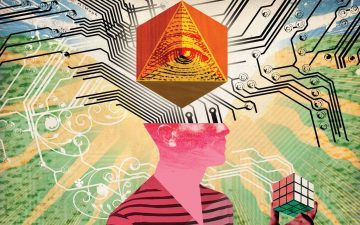Tim Rogan in New Statesman:
 Will the robots of the future be able to replicate human thought? Most engineers assume so with a casual fatalism: the rate of advance in artificial intelligence (AI) is so rapid that it is only a matter of time before robots indistinguishable from human beings are built. Will the robots of the future surpass and then subordinate their creators? Some of the initiated believe so. This impending apocalypse has a name – “the singularity” – and is confidently expected in some quarters as soon as 2045.
Will the robots of the future be able to replicate human thought? Most engineers assume so with a casual fatalism: the rate of advance in artificial intelligence (AI) is so rapid that it is only a matter of time before robots indistinguishable from human beings are built. Will the robots of the future surpass and then subordinate their creators? Some of the initiated believe so. This impending apocalypse has a name – “the singularity” – and is confidently expected in some quarters as soon as 2045.
Most existing AI systems have a narrow remit. They are task-focused, designed to perform some specific function – recognising speech, say, or diagnosing melanoma. Driven by the aggregation of huge data sets and explosive increases in computer processing power, “machine learning” – a newly effective technique for designing algorithms – is facilitating impressive advances in the capabilities of these systems. Machine learning-trained algorithms now outperform human specialists across a range of applications. But artificial general intelligence (AGI) systems that can imitate human thought, like the robot Hal in Stanley Kubrick’s 2001: A Space Odyssey– which experts have been claiming are “just around the corner” since about 1956 – remain the stuff of science fiction.
Jamie Susskind does not think the distinction between the two forms of artificial intelligence – the specific AI and the human-like AGI – matters much. Specific AIs will be hard enough to handle, creating “vast new opportunities and risks worthy of careful attention in their own right”. If you integrate enough specific AIs into a single interface you might well end up with something so good at giving “the impression of general intelligence” that it is functionally indistinguishable from the AGIs of the engineering imagination. Whether or not AGI fictions like Hal become reality does not matter, Susskind insists. We need to stop debating such distinctions and knuckle down to the hard work of adapting our politics to a world reshaped by AI.
More here.
